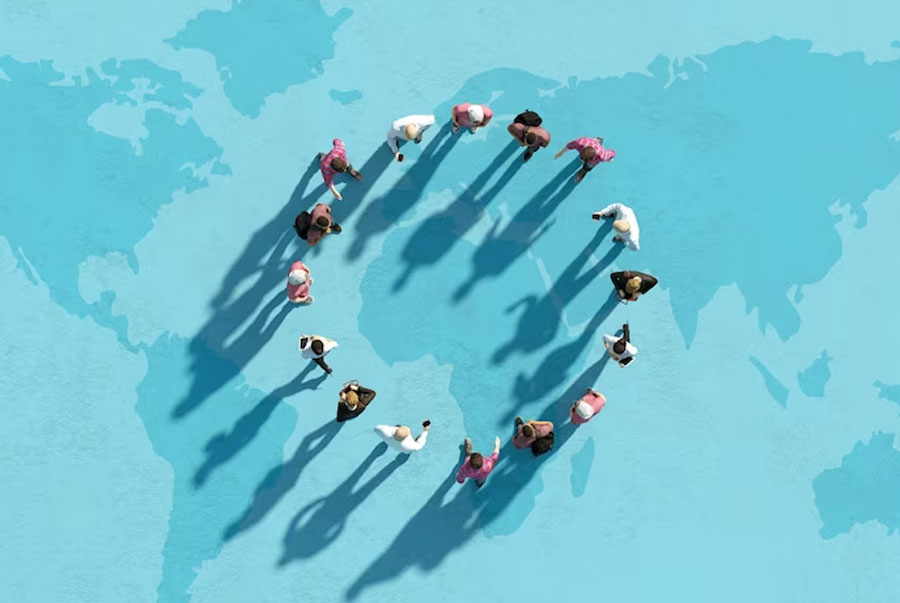A new study calculated the average “global human day” reveled which activities take up most of our time.
Hi reader! on November 1st, 2023, scientific American published an article written by Clara Moskowitz to “See How Humans around the World Spend the 24 Hours in a Day” and calculated/analyzed which of the activities takes up most of our time.
She says that though every human on the earth has 24 hours to spend in a day but the way we divide those hours in performing various activities is different.
Analysis of the recent data explained on how we allocate our time and use it to defined the average “global human day.” It is revealed that more than a third of our 24 hours (9.1 hour) are spent in bed and the remaining (14.9 hours’ time) split among three categories devised by the researchers which are based on whether the time directly affected humans, the physical world, and/or where and what people are doing?
The analyses found that per average human, there is relatively little time to be spent on activities that can directly alter the environment and climate change, such as extracting energy and dealing with waste suggesting an opportunity to put in more time to help the planet.
Does this mean that if we allocate more time to activities related to environment/climate change we can improve the existing situation?
“If allocation of more time is required to make the changes to go something good for environment change, we should do it right now . An increase of time for this activity even if it is as small as a couple of minutes per day will have an impact.
Now let’s see in detail how we spent the time left after the one third that we spent in bed (8-10 hours).
This time which is (14.9 hours) is divided into three categories mentioned in the beginning whether this time directly affects the humans, the physical world, and/or where and what people are doing?
One of the most important activity that affect human life is Agricultural activities which takes more time in poor countries compared to the time spent in the wealthier/richer countries while time spent on human transportation is almost equal and endless.
The question is why do poor countries spend more time on agricultural activities compared to rich countries?
The answer is that there are differences between the agriculture industry of the developed and developing world. For example:
Technology: Developed nations are inclined toward and have easy access to more advanced technologies in agriculture, such as precision farming, smart farming, biotechnology, digitalized farming and mechanization of farming. Developing nations, on the other hand, rely largely on traditional farming methods such as ploughing with tractors but in rural areas, it is still with oxen and horses: A plough that may have a wooden, iron or steel frame with a blade attached to cut and loosen the soil, It has been fundamental to farming for most of history. Tractors are used on big farms but in rural areas manual plowing, sowing with manual drill machines, and hand harvesting is practiced which obviously takes more time.
Infrastructure: Developed nations typically have better infrastructure such as roads, railways, and ports for transporting goods, which make it easier to get crops to the market. Developing nations on the other hand generally lacks such facilities, especially in the rural areas where road are of low quality and/or non-existent, which makes it more difficult to transport crops.
Government support: Developed nations may have more government support for their agricultural industries such as subsidies, research and development funding, and trade agreements. In developing countries, farmers hardly get even loans to purchase agricultural inputs comprising seeds, fertilizers, pesticides and even the timely supply of irrigation water, which is a lifeline of agricultural productivity. All this makes it extremely difficult to compete in the global market.
Market access: Developed nations often have better access to global markets, which can help them sell their products internationally. Developing nations may face more trade barriers and restrictions, which can limit their ability to sell their products abroad.
Other major life activities are functions that are important to most people’s daily lives. For example, breathing, walking, talking, hearing, seeing, sleeping, caring for oneself, performing manual tasks, and working.
Activities such as meditation, writing, eating healthy and well, exercising, quality relationships and a community, belief in something greater than us, inner exploration and peace are some of the things which help assure we maintain and improve our overall health.
Transportation, however, is an areas where time spent is almost equal and endless in developing and developed countries. For many, transport improvement in the developed countries, assigned value of saving time is the main dominant benefit especially the time spent in journey to work. In developing countries, however, there has been considerable reluctance to attribute any value to time although in recent years, western ideas have been applied often uncritically which means without considering if the venture is right or wrong (changing clock time in winter to increase more daylight once practiced in Pakistan was one such venture that even the educated people could not comprehend).
Now let’s look into the details of the division of 24 hours a day into various activities.
Of 24 hours, 9.1 hours goes to sleep and remaining 9.4 hours goes to direct human outcome.
Of this 9.4 hours, 6.5% are oriented towards passive, interactive and social experience, (1.6%) goes to meals while 0.4% goes to active recreation .
Of the 9.4 hours that goes to direct human outcome, 1.6% goes to somatic maintenance (the turnover of structural mass such as proteins and the maintenance of concentration gradients of metabolites across membranes for counteracting leakage related with maintenance of respiration) which comprises hygiene and grooming (1.1%), physical childcare (0.3%),and Health care (0.2%).
Of the 9.4 hours that goes to direct human outcome 1.3% goes to deliberate neural restructuring (It is when the brain is rewired to function in a way that differs from how it previously functioned.) comprising 1.1% that goes to schooling and research and 0.2 % allocated for religious practices.
The largest chunk of time out of sleep is associated with activities that focuses directly on human changing either their bodies or their minds, eating, grooming, playing sports, watching TV, meeting with friends, caring for children, going to school and attending temple, mosques, or churches.
To keep categories as consistent as possible across different cultures and languages, the researchers used physical rather than idiomatic or everyday description.
The second largest block (3.4 hours) of the time goes to external outcome i.e., activities that change the physical world. For instance, “food provision” (1.8%) of which 0.9% is allocated to food preparation, 0.8% to food growth and collection, 0.1% to food processing, 0.8% is allocated for maintenance which all goes to inhabited environment while only 0.01% goes to waste management.
Of 0.7% allocated to techno-sphere creation, only 0.1% goes to nonfood provision while 0.4% goes to artifacts (an object made by human being typically of cultural or historical interest), 0.2% to buildings, 0.05% to infrastructure, 0.07% goes to material and 0.04% goes to energy.
There is also a third but the smallest category (organizational outcome) to which only 2.1 hours of time is allocated. Of this 2.1 hours, 0.9% goes to human transportation, 0.9% goes to allocation and 0.3 % goes to material transportation.
Did you see dear readers, what type of research is being done in the world? The objective of this type of research is probably, to see where we are spending time more and where it is less than the requirement. If the allocation of time is changed, we can see the impact accordingly.
This division of time is also indicative of our seriousness in work, or if we are just a crowd of lazy people not at all interested in work.
Dear reader time is precious, and we have only 24 hours but if we spent twenty-three and half hours on gasping or talking on phones, we will not be able to achieve any thing and will be like of most of the younger generation of current Pakistan: the useless crowd.
Nathaniel Hawthorne: an American novelist and short story writer once said,
“The time flies over us but leaves its shadow behind.”
This article was originally published with the title “How We Spend Our Time” in Scientific American 329, 4, 94-95 (November 2023).
You can read the details in
doi:10.1038/scientificamerican1123-94
See you next week, bye.





